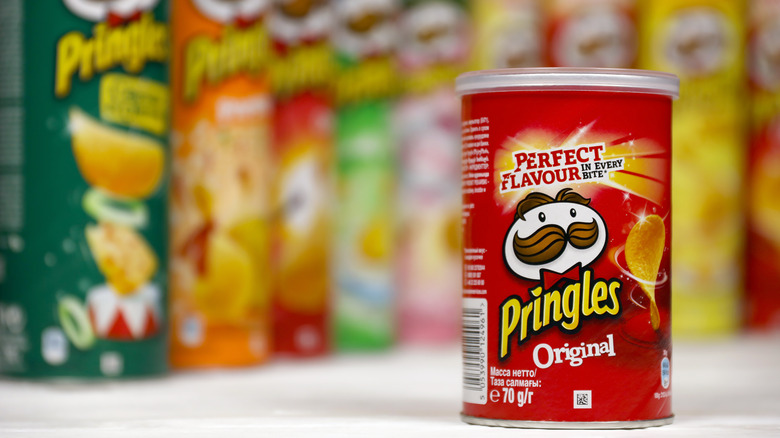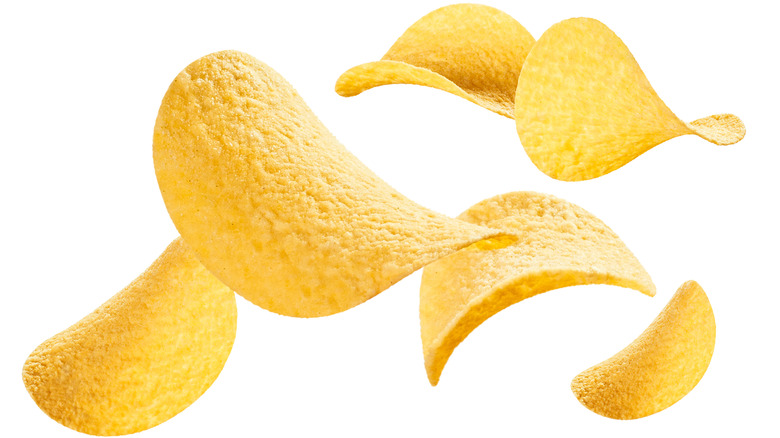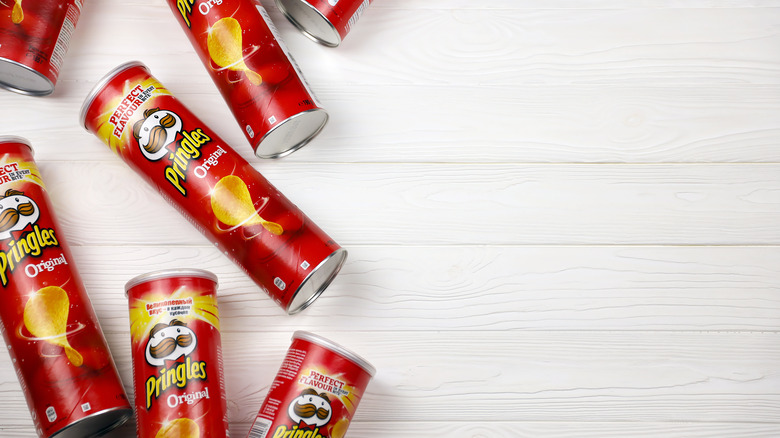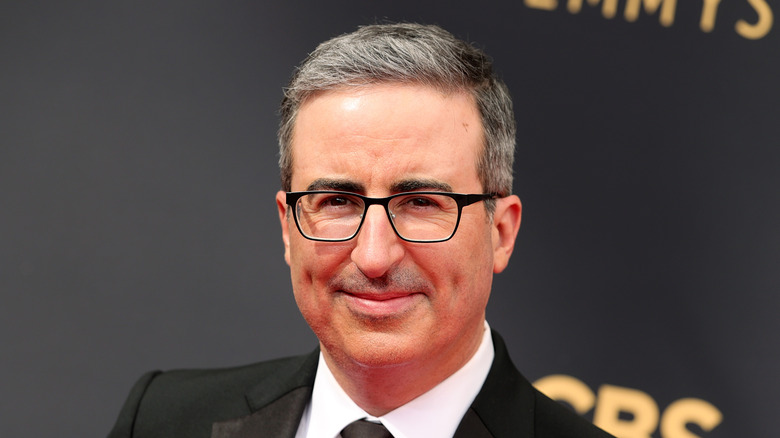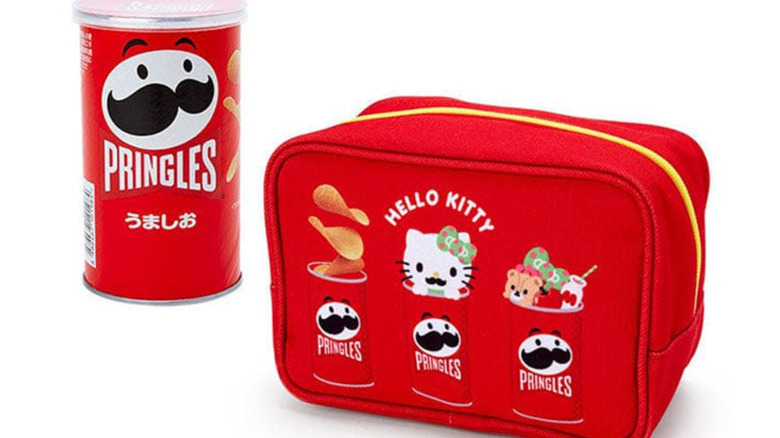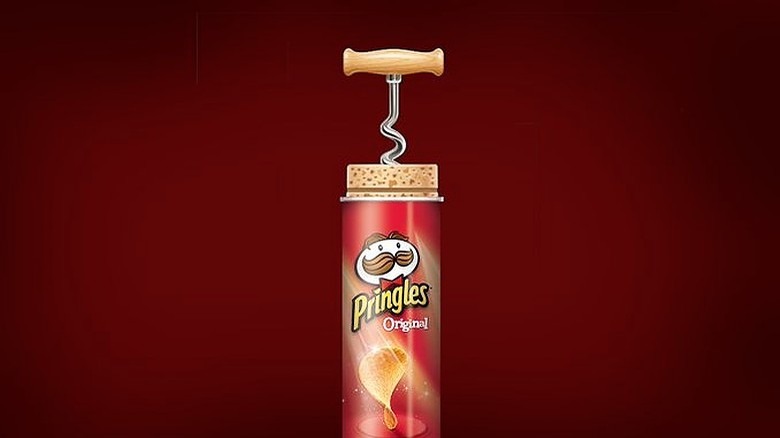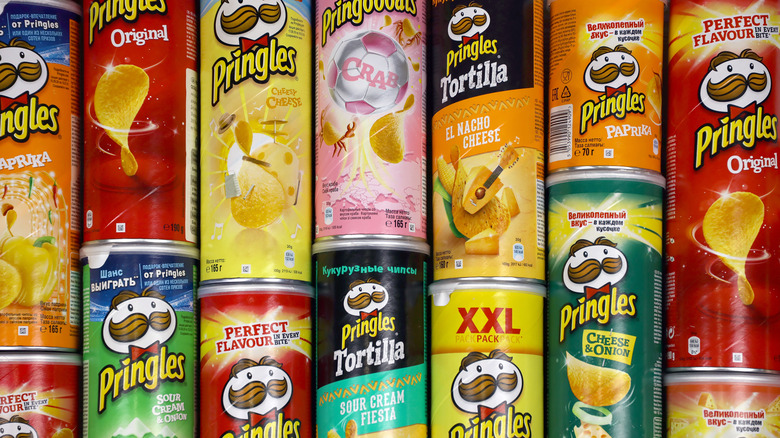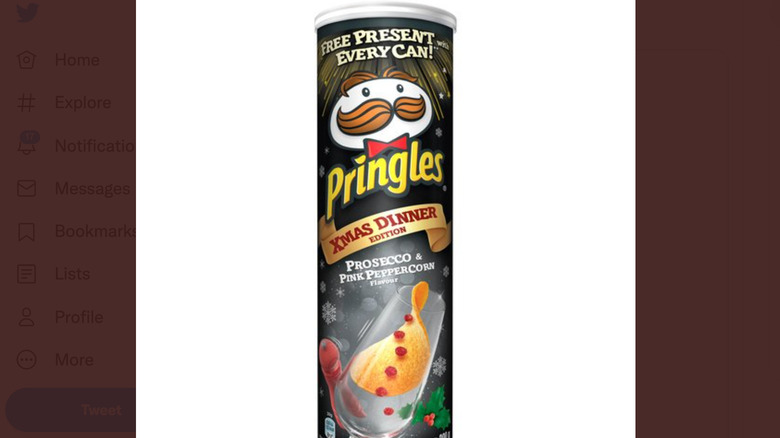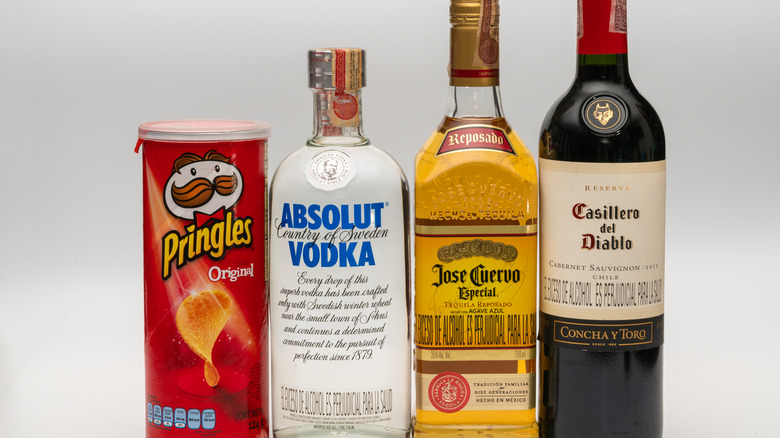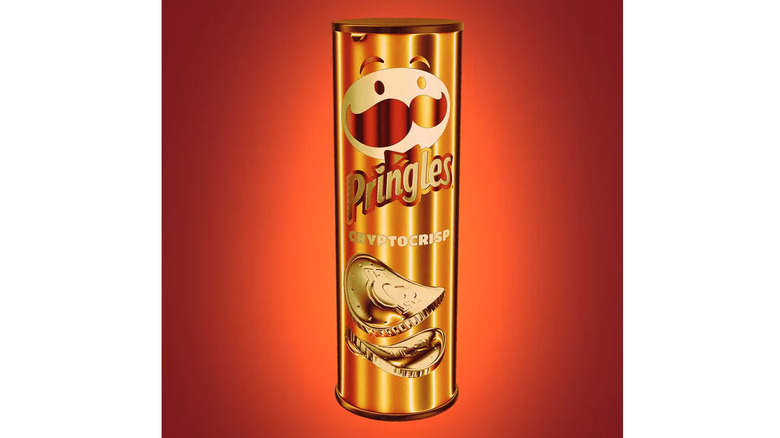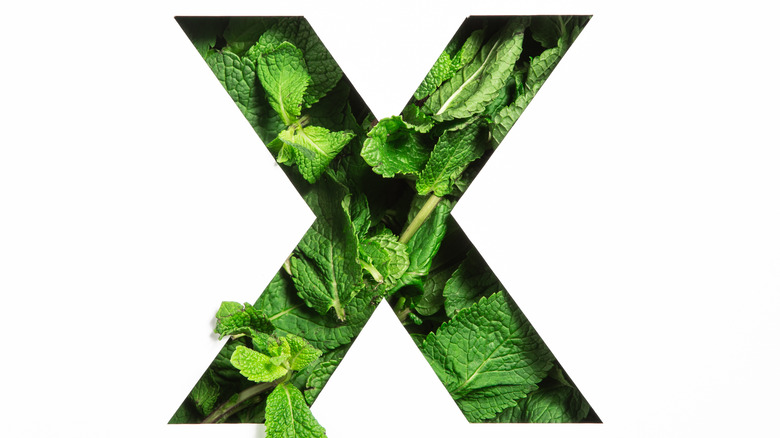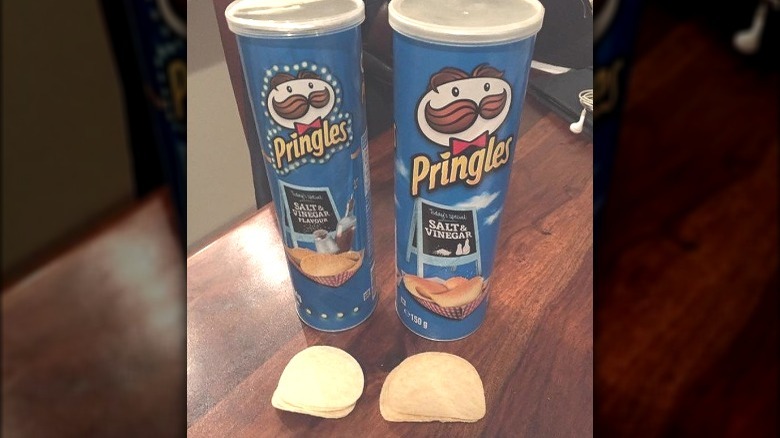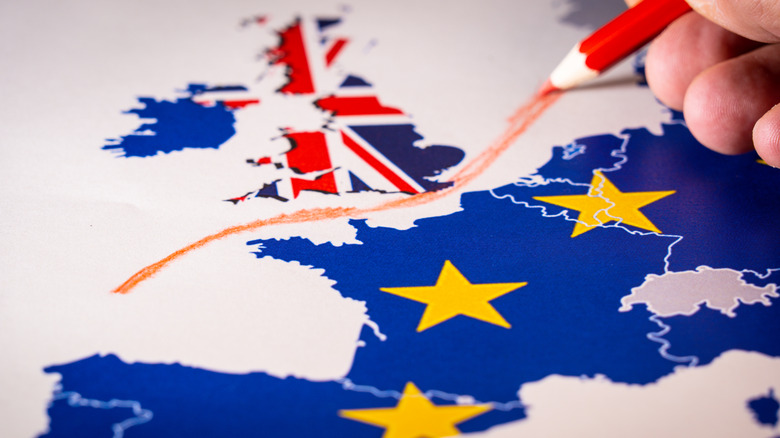The Untold Truth Of Pringles
It so happens that the history of Pringles is about as colorful as the brand's containers of assorted flavors. What began as a mission to solve the problem of broken potato chips at the bottom of the bag soon evolved into a story of technological innovation, international intrigue, existential debate, and silly cartoons.
While the jury is still out on how Pringles got their name according to The Atlantic, their status as an American snack icon is unquestionable. The saddle-shaped potato crisps are sold in more than 140 countries (per BBC) in countless imaginative flavors. They're crunchy, salty but not greasy, and most importantly, they're fun to play with. But there's certainly more to Pringles than their unique ability to serve as pretend duck bills.
Even though the ingenious cylindrical Pringles can design solved the riddle of broken potato chips, they weren't guaranteed immediate success. However, when they eventually broke through the market, they became one of the top three best-selling potato chip brands (via Statista).
Pringles almost tanked in the 70s
According to Pringles, inventor Frederic Baur set out to perfect potato chip packaging in the 1950s. His goal was to find a way to store chips to keep them as fresh and intact as possible. What he came up with was a vacuum-sealed tube that snuggly fit stackable, saddle-shaped chips. Known in engineering as the "hyperbolic paraboloid," this unique shape offers excellent structural integrity. According to Interesting Engineering, it's also partly responsible for the chip's satisfying crunch!
Pringles were first released in the late 60s, but while the shape and packaging were novel and intriguing, the taste left a lot to be desired. The 70s were an uncertain time for the budding potato chip brand, and many consumers believed it was doomed to fail (via The New York Times). The company went to work improving their recipe, eventually patenting it with the help of Alexander Liepa. Thankfully, the new recipe worked so well that today, Pringles is one of the most popular brands of potato chips in the world!
The inventor of the Pringles can was buried in one
It's not unusual for people to want to take their prized possessions with them to the grave. Ancient Egyptian pharaohs were buried with hordes of treasure to take with them to the afterlife, after all. But what about being buried inside your favorite possession?
Organic chemist, Navy aviation physiologist, and Pringles can inventor Frederic Baur considered the potato chip tube his crowning achievement in life. He was so proud of it that before he died, he told his family he wished to be cremated so that his ashes could be buried in the can. According to Time, his children initially thought it was a joke, but Baur was firmly committed to the idea. So, when the great inventor eventually passed away in 2008, his loved ones didn't pick out a fancy urn or a stately casket. They simply went to Walgreens, bought a can of Original Pringles, and said goodbye to their patriarch in a humble and oddly sweet way.
Countries have differing views on whether they can be considered potato chips
Astute consumers will notice that Pringles call their potato chips crisps. That's not just word choice preference; it's actually the result of a legal encounter with the United States Food and Drug Administration in 1975 (via The New York Times). The matter at hand: Are Pringles potato chips really potato chips?
Traditionally, potato chips are thin slices of raw potatoes that have been fried. Pringles, however, are made with dehydrated potatoes. On top of that, they also contain various other ingredients, including corn flour, rice flour, and wheat starch. The FDA ruled that Pringles could continue calling their product potato chips, so long as they accompanied it with a disclaimer. Instead, the snack brand opted to rename them crisps.
But that wasn't the end of the debate. According to Mental Floss, the question was raised again in 2007 in Britain, this time due to taxes, not marketing. In Britain, there is a 17.5% tax on any product made "wholly" or "substantially" from potatoes. This time, to avoid the tax, lawyers argued that Pringles weren't technically potato chips. After a dizzying amount of back and forth between British courts, the case made it to the country's Supreme Court, which ultimately ruled Pringles to be potato chips. The brand was forced to pay $160 million in taxes.
So, are they chips or are they crisps? It depends on what country you're eating them in!
John Oliver donated $10,000 to Feeding America for the Pringles mascot body reveal
Several changes have been made to the Pringles logo over the years, Reader's Digest describes. While the instantly recognizable, round, floating head named Julius Pringles has always sported a large handlebar mustache, his eyes have changed from red to black, and his hairstyle has varied from slicked back to coiffed. (Currently, Mr. P's latest look features no hair on top at all — just eyebrows.)
One aspect of the Pringles mascot that has never been shown, however, is his body. And this frustrated "Last Week Tonight" host John Oliver so much that he went on an entire on-air tirade about it (via Vulture). Fans of his show were inspired by his rant and came up with their own ridiculous depictions of what they thought the Pringles man's body secretly looked like. Drawings included a mock-Sports Illustrated sexy swimsuit cover, an octopus, and a hermit crab.
While Oliver was amused by all of this, he still demanded an answer from the brand itself. He pledged to donate $10,000 to Feeding America if Pringles did the big reveal. Well, not only did Pringles get a live mascot to don a full-bodied Julius Pringles costume on Twitter, but they matched Oliver's donation for a grand total of $20,000!
There are Hello Kitty Pringles for her fans
Hello Kitty is one of the most iconic characters in the world, and there are countless pieces of merchandise with her face on it, from blankets to dog dental treats. The Sanrio character has been a part of numerous brand collaborations, including Pixi Beauty, Pusheen, and yes, Pringles!
According to Japan Today, Miss Kitty and her pal Cinnamoroll are taking up Julius Pringles' mustache in a collaboration that features stickers, tote bags, mini towels, plush toys, and more. Miss Kitty sports the color red to match the color of the Original Pringles can, while Cinnamoroll wears green to represent the Sour Cream & Onion container. It's a hot grab for collectors of pop culture merchandise as well as casual snackers and kawaii (Japanese cute culture) lovers. Like this specially designed Cinnamoroll Pringles pen stand from online Japanese retailer Sugoi Mart indicates, it's all about fun and flavor!
A Pringles can hack got someone banned from Walmart
The Pringles can is more than just an innovation in potato chip engineering. The cylindrical canister can be hacked or upcycled for various other functions. People have figured out how to turn the tube into a phone speaker, a bird feeder, and even a crafty medieval tower! One Texan woman even discovered it could be a sneaky way to hold her wine, leading to a bizarre incident in Wichita Falls in 2019.
According to Austin Monthly, the woman decided it would be fun to drink wine out of a Pringles can and do loops around a Walmart parking lot in an electric shopping cart. Perhaps the weirdest part of it all was that this took place at around 6:30 a.m. (Because how else is someone supposed to start the day?) Her antics didn't go unnoticed, although according to AP News, the unnamed woman did get to enjoy several hours of frolicking before the police were called at 9 a.m.
She was subsequently banned from said Walmart, however, her stunt managed to inspire locals. Austin Monthly reports that a bar in Houston even introduced a $3 drink special served in a mini chip can. A Facebook event was also organized in Austin for people to gather and try the Pringles can hack together.
Pringles come in an incredible range of flavors
Snack companies work hard to offer assorted flavors in different countries to suit local palates, and Pringles is no different. Actually, it probably wouldn't be wrong to say that they produce more flavor varieties than the average snack brand. Of course, Original Pringles are everywhere, and flavors like Sour Cream and Onion, BBQ, and Pizza are domestic classics. Abroad, consumers can find flavors like Sichuan Spicy Fried Chicken, Miso Ramen, and Beef Bowl in Japan (via Sugoi Mart). Meanwhile, Prawn Cocktail and Piri Piri Chicken are available in the U.K., while Ham & Cheese and Mushroom & Cream are sold in Hungary.
Pringles has also produced an astounding catalog of limited edition flavor lines, such as Thanksgiving Dinner (featuring turkey, stuffing, and pumpkin pie) and a Wendy's collab line highlighting the Baconator and Spicy Chicken. And because the potato crisps are stackable, there are countless flavor combinations for consumers to come up with on their own. Kansas City Chiefs player Byron Pringle has his own Byron Pringle Kansas City BBQ Stack, which consists of BBQ, Jalapeño, and Sour Cream & Onion flavors (via KSHB).
Italy was furious about Prosecco-flavored Pringles
Italy has an astounding number of food and drink items that are given official certifications of authenticity by the European Union. According to Statista, at least 295 foods and 523 wines are protected by law — more than any other nation in the EU. One of those items is Prosecco sparkling wine, and Italy stands at the ready to fiercely defend it from imitations.
So, when Pringles came out with a Prosecco and pink peppercorn flavor as part of their Xmas Dinner Party product line, Italian officials were outraged (via The Guardian). Pringles may have thought they were just coming out with a fun new flavor, but in Italy, this was perceived as a very serious crime of identity theft. A full investigation was conducted and hundreds of cans of the flavor were seized from supermarkets in the Italian region of Veneto.
For their part, the snack company said that it was a limited European flavor that made use of the Italian wine, and the proper certification was displayed in the ingredient list (via Forbes). However, Italian officials asserted that they were never informed of it before the product's release. If they had been, they probably would have squashed the idea of using their precious wine for an American junk food snack outright.
Pringles are one of the most popular hotel minibar snacks
CNN Money calls it one of America's "biggest rip-offs," and its main purpose is as a last resort for people who are just too lazy — or drunk — to head out to a store to get their own snacks. We're talking, of course, about the hotel minibar. Most people tend to avoid indulging in drinks and snacks from hotel minibars because of the 1,300% price markup, per CNN. But if hunger strikes, Pringles are an obvious choice among the selection.
In fact, according to The Washington Post, Pringles are one of the top-rated hotel room snacks. In 2017, Hotel Online ranked the chips in second place, just behind water. And while publications like The Washington Post and CN Traveler write that the survival of the minibar will depend on including more unique, artisanal, location-specific offerings, they all point to Pringles as one of the mainstays of the traditional hotel amenity.
A virtual Pringles CryptoCrisp NFT was purchased for more than $8,000
NFTs, or non-fungible tokens, are unique digital files. Like limited-edition vinyl records or one-of-a-kind paintings, NFTs are collector's items — and they can fetch very high prices. (For instance, CNBC reports that Twitter CEO Jack Dorsey sold his very first tweet for nearly $3 million.)
In 2021, Pringles released their own NFT: CryptoCrisp. According to HypeBeast, the digital art depicting a golden Pringles tube was created by artist Vasya Kolotusha. Only 50 copies of the virtual flavor file were made available for purchase on Rarible.
Now, buying an NFT is like entering a bidding war. While a real edible can of Pringles may only cost a couple of bucks at the grocery store, this chromed-out image has gone for exponentially more money. The highest bid as of the date was placed on September 1, 2021, in the amount of 2.55 ETH (Ethereum, a type of digital currency). The value of 1 ETH at the time of purchase was about $3,529 (via Pound Sterling Live), meaning this copy of the Pringles NFT cost almost $9,000.
Pringles are no longer vegan
Demand for plant-based and vegan-friendly products has skyrocketed in the last few years. Fortune reports that plant-based alternatives to dairy and meat products reached $29.4 billion in sales in 2020, and estimates that number will quintuple by 2030. And fast-food titans have taken notice, with Dunkin Donuts, Starbucks, Burger King, and KFC rolling out plant-based meat alternatives to hamburgers and breakfast sausage sandwiches, as well as nut, oat, and soy milk alternatives to dairy.
Yet while the food industry overall seems to be making more options readily available for vegans and vegetarians, Pringles has announced they will do the exact opposite. The Beet reports that Pringles will be adding milk-based ingredients to chip flavors that were previously vegan-friendly, such as Sweet Chili, Smokey Bacon, and even Original.
A Pringles representative cited saving costs and reducing food waste as reasons for the change. Vegans were of course disappointed by this, and questioned how adding dairy into the recipe could possibly be better for sustainability (via Totally Vegan Buzz). Maybe it will save the company money in short-term production costs, but in an increasingly plant-based society, is this choice wise for the future? Time will tell.
Pringles angered Australians by reducing the chip size
Another demonstration of the brand's cavalier approach to consumer demands occurred in Australia in 2016, where a change in the classic Pringles chip size, taste, and cost angered locals (via Food & Wine). All of a sudden, Australian customers discovered that their regular Pringles cans were more slender than usual, and the chips inside were smaller and rounder compared to the classic saddle shape. The flavor was also different, and despite the shrinkages, the cost went up!
Complaints such as "My hand no longer fits in the can so I can't get the chips out anymore!" and "Did you change the price now that the cans are smaller?" flooded the company, to the point where Pringles Australia addressed these exact concerns on the FAQ section of their website. The brand's response in a nutshell: Deal with it.
Pringles acknowledged that all the complaints were valid, and the changes in their potato chips were the result of production moving to a factory in Malaysia. The recipe did in fact change to include more potato and less MSG per Smart Company, and the Malaysian equipment was smaller, resulting in smaller cans and crisps. The company isn't planning on doing anything about it, and Australia and New Zealand will now exclusively get the Pringles made in Malaysia, not the United States.
Kellogg's spent $3 million to make sure Britain had enough Pringles after Brexit
After much internal turmoil, the United Kingdom ultimately decided to leave the European Union, a move known as Brexit, effective January 1, 2021. UK citizens and companies with international business dealings there had plenty of concerns; the latter were worried about what Brexit would mean for supply and demand and the flow of goods.
According to Reuters, the UK's supply of Pringles actually came from factories located in Belgium. Kellogg's, the chip brand's parent company, was worried about how Britain would receive their beloved potato crisps if those European economic and trade ties were cut. So, Kellogg's invested upwards of $3 million in new warehouses and extra inventory to stock up for a possible snack industry doomsday. Those who didn't vote in favor of leaving the EU can rest easy on one point: At least you have your Pringles.
